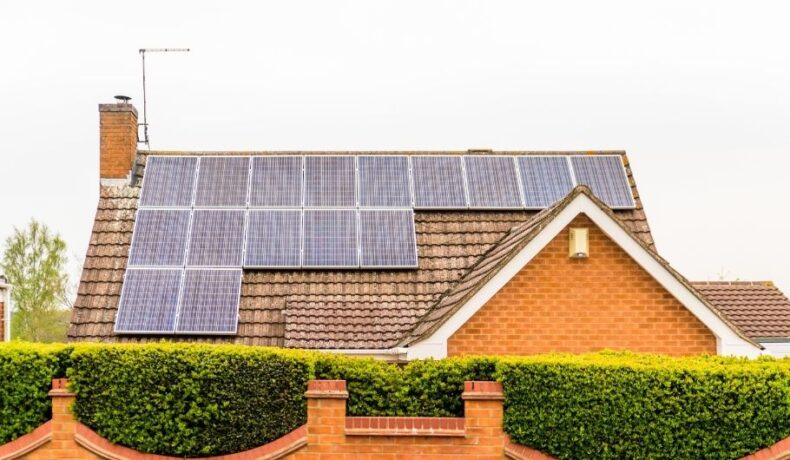“Are solar panels worth it in the UK?”
Chances are you already feel strongly about climate change and are part of the 79% of Britons supporting renewables.
However, we can’t help but scratch our financial itching. You just have to know if it is worth installing solar panels on your home in the UK.
Contrary to what some of you might think, this is not a simple yes or no question. We can provide you with the facts, but the decision rests entirely on you.
Overall, solar panels are worth it in the UK. Peak sun hours, electricity consumption, solar incentives, among others, directly affect the payback period. Expect around 10 to 15 years for you to get a return on your investment, but nothing beats going solar to fulfill your duty towards saving the planet.
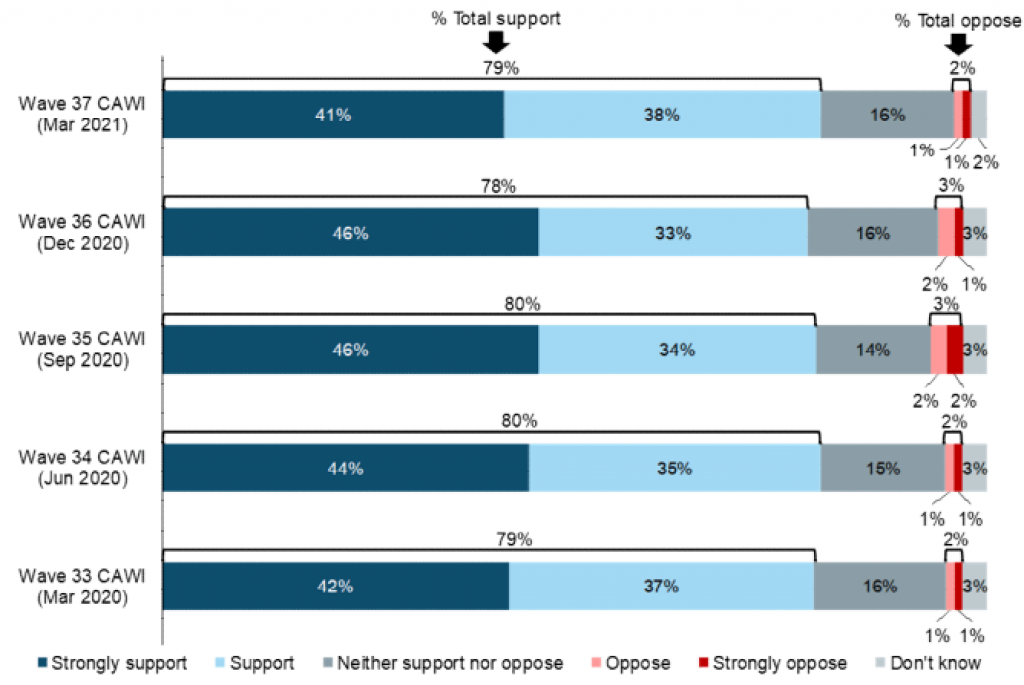
Table of Contents
Are Solar Panels Worth It In The UK?
In our experience, people looking at solar panels from a purely financial lens need to understand that this subject is far too complex for a simple yes or no answer.
You already probably know this, but the best way we can explain this to you is through case studies based on our research and level of expertise.
Figuring out if solar panels are worth it in the UK uses the same process for all solar costing methodologies with varying factors. These include peak sun hours, incentives, and policies revolving around renewable energy technology. It has come a long way and is ripe for the taking.
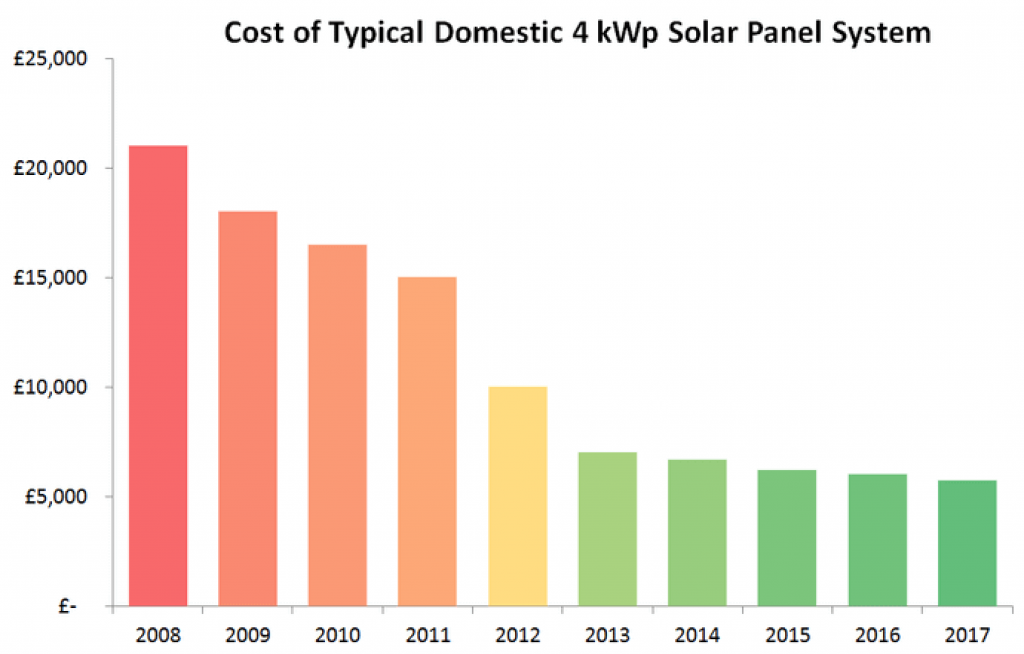
Determining if solar panels are worth it in the United Kingdom highly depends on the following:
- Total solar system cost
- Total annual savings
- Payback period
First, let’s figure out the total solar system cost before calculating your electricity savings and payback period in the next section.
Finding out the total solar system cost of a solar panel system is best done with a reliable solar installation company. However, it is not impossible to figure it out on your own.
Now, let’s go through the key steps to comprehend the total cost of solar fully.
Know Your Electricity Consumption
Knowing how much solar power you need begins with looking at your annual electricity consumption. The simplest way to do this is to add all the kWh usage that you see from your electric bill.
You can use your total annual electricity consumption to size your solar panel system with the following formula.
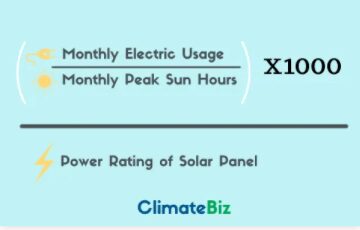
In the UK, the annual electricity consumption of a typical home is about 4200 kWh or 350 kWh a month.
Peak Sun Hours in the UK
Now, the last variable you need to determine your solar system size is the average available peak sun hours in your area.
“What are peak sun hours?”
Simply put, it is the length where you get the most sun power throughout the day.
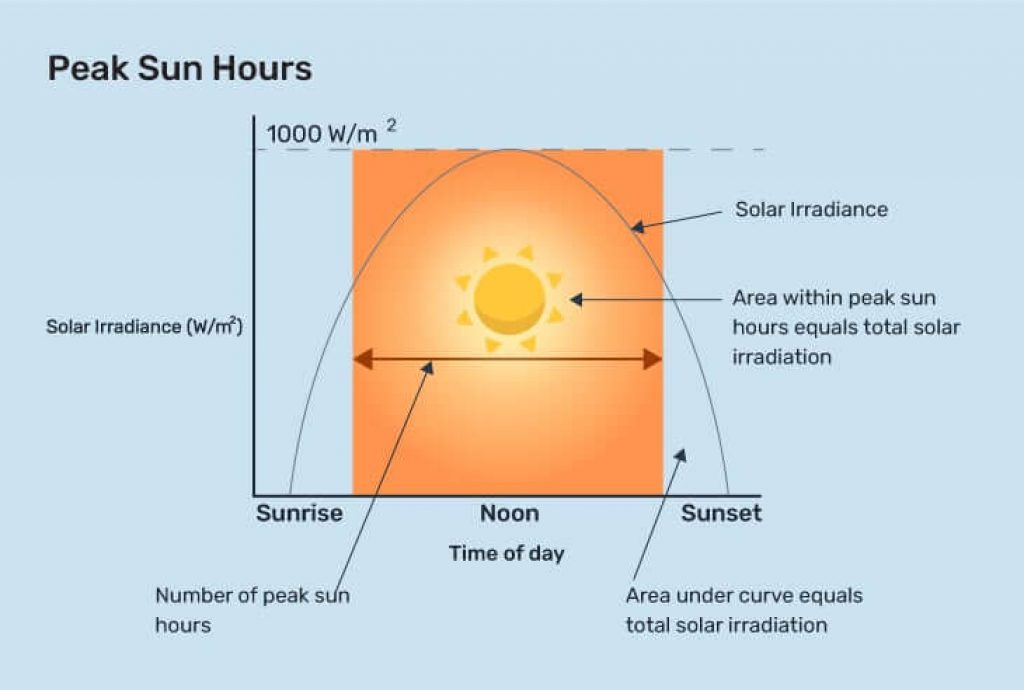
If you want the formal definition, a peak sun hour is one hour in which the intensity of solar irradiance (sunlight) reaches an average of 1,000 watts (W) of energy per square meter.
For the UK, the peak sun hours fall between 2.4 and 2.9 daily. Multiplied by 365 (non-leap year), you get 876 – 1058.5 peak sun hours per year or 73.2 – 88.4 per month.
Sizing your Solar Panel System
Okay, we have everything we need. We can now compute the total solar system size of your home by dividing the total monthly electricity consumption by the monthly peak sun hours:
- Lower bound solar system size: 350kWh divided by 73.2 = 4.78 times 1000 equals 4781 watts or 4.78 kW – approximately 5kW.
- Upper bound solar system size: 350kWh divided by 88.4 = 3.95 times 1000 equals 3959 watts or 3.9 kW – approximately 4kW.
Great! We now know that we need a solar panel system that falls around these values, again this assumes your home consumes the average electricity consumption for the UK.
Before we move on to the next step, here is a bonus tip: Aside from sizing solar panel systems, you can also use your annual electricity consumption to determine WHEN and WHERE you consume electricity in your home. You can track the electricity usage of appliances and solar systems in real-time using smart energy monitors.
What’s the reason for doing this? For one thing, monitoring your electricity gives you feedback on the efficiencies of your appliances. You can swap out wasteful and clunky ones for more modern alternatives.
You can also see how much your electricity consumption varies per season. It is no secret that heat pumps contribute significantly to your electricity bills when it regulates the house’s temperature. Knowing their impact on your bill empowers you to make decisions to improve your situation.
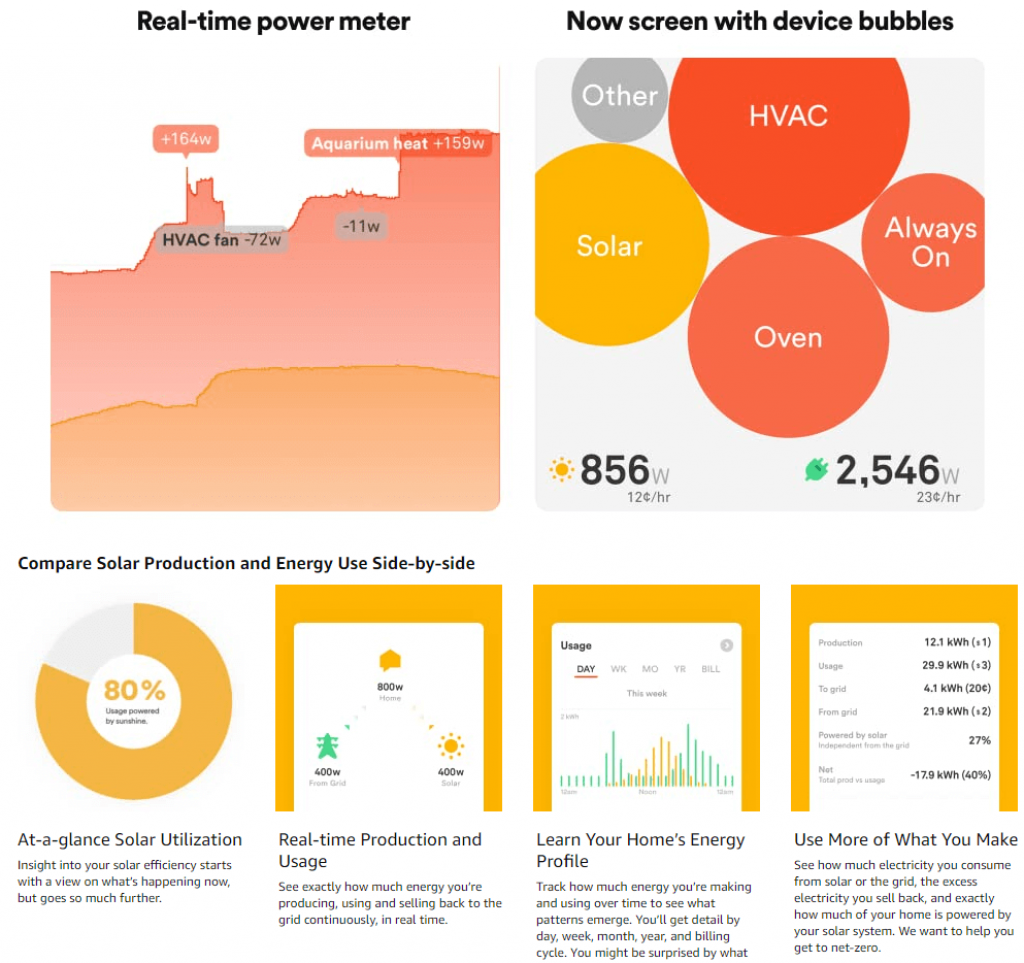
Get a Quote on Your Solar Panel System
We recommend getting a quote on your solar panel system costs from multiple solar installers to get the best offer possible.
If you are looking for a ball-park figure, Solar panels systems sized up to 10kW are worth around 1,700 British pounds per kilowatt installed.
Using our previous solar panel system size of 4 to 5kW, you can expect total cash out of £6,800 to £8,500 without solar battery storage.
“What’s a solar battery storage device?
Let’s save that talk for later. Don’t worry. We will help you decide.
UK solar incentives
Before we compute the savings, let’s see if it is possible to reduce the cost further using the incentives available in the UK.
We did some digging and found three policies for solar owners.
Feed-in Tariffs (FiT) are payment schemes for people who generate electricity and heat energy from solar. Unfortunately, the window of opportunity to enjoy FiT has already passed.
On the other hand, the Smart Export Guarantee (SEG) program pays you 5.5p per kWh of solar electricity fed into the grid. We don’t recommend oversizing your solar panel system for this. You could think of this as the government providing you the last resort for your excess solar energy.
Lastly, you have the Renewable Heat Incentive (RHI), which encourages people to power their heat pumps using renewable energy. The UK government initiated the RHI in April 2014 and is open to homeowners.
In exchange for heat generated from solar thermal panels, the government will pay you 19.2p/kWh in a contract that will last seven (7) years. The RHI scheme closes to new applications after 31 March 2022.
How Much Can A Solar System Save You In The UK?
According to PV Watts, a 4kW solar system in the UK will produce about 3,493 kWh a year, while a 5kW solar system will produce about 4,366 kWh.
The electricity cost in the UK is 14.37 pence per kWh.
Multiplying 4,366 kWh per year by £0.1437 gives you £627.4 per year saved.
On the other hand, 3,493 kWh multiplied by £0.1437 gives you £501.9 worth of annual electricity savings.
This applies if you have a solar system installed that offsets 100% of your energy consumption.
Now, are the savings from solar panels enough to earn back their cost in the UK? Let’s calculate the payback period next.
Payback Period
We already know that the total cost for 4kW and 5kW solar systems are £6,800 and £8,500, respectively.
Dividing the £6,800 by the £501.9 annual electricity savings gives you a payback period of 13.5 years for your 4kW solar system.
Doing the same for the 5kW solar system gives you a payback period of 13.5 years as well.
And yes, for the personal finance geeks out there, this does not consider inflation adjustment and your initial investment opportunity costs.
Bottom line: Solar panels in the UK take about 13.5 years to be paid back in full through solar savings.
Should You Get Energy Storage?
Deciding whether you should get energy storage or not depends on your answer to the following questions:
Do you consume electricity the most during midday or later in the evening?
Do you often need backup power for emergencies?
How you Consume Electricity
In a nutshell, the decision to put in energy storage has a lot to do with how you consume electricity at a certain period, also known as your load profile.
Utilities usually plot the typical day or year of residential electricity consumption as part of their load-generation balancing process. The load profile also varies per social class.
For example, the average residential load profile in the UK looks like this,
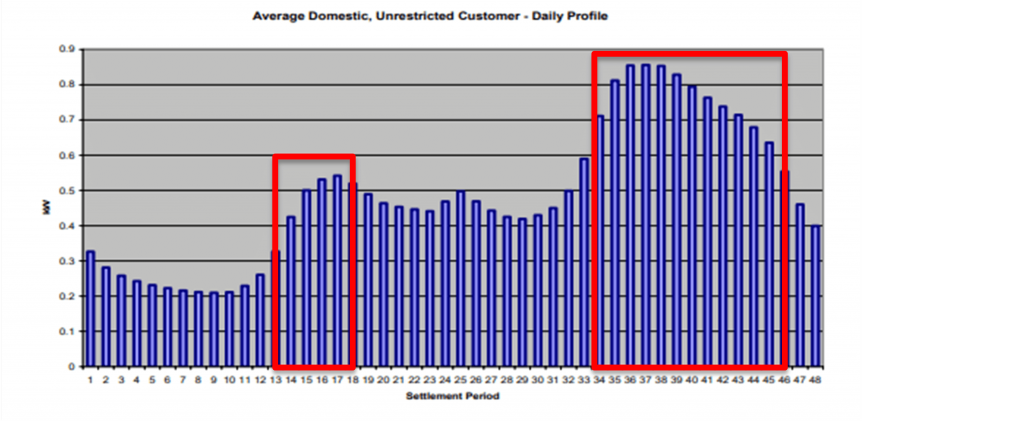
While the typical annual load profile looks like this.
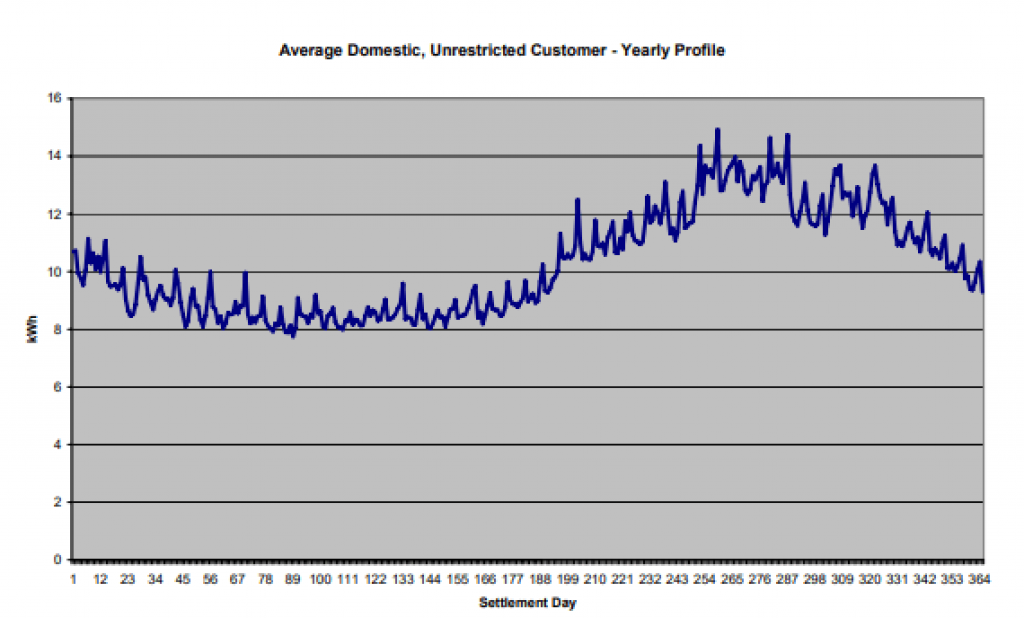
Based on the daily load profile, you can observe that the first electricity spike in a house occurs at 7 to 8 am (settlement period 14 to 17 at the daily load profile figure). It then subsides during the middle of the day and begins to peak at 5 pm (settlement period 35 onwards).
These peaks also vary per season. As seen in the yearly load profile, peak electricity consumption begins to rise as we move toward the third quarter of the year.
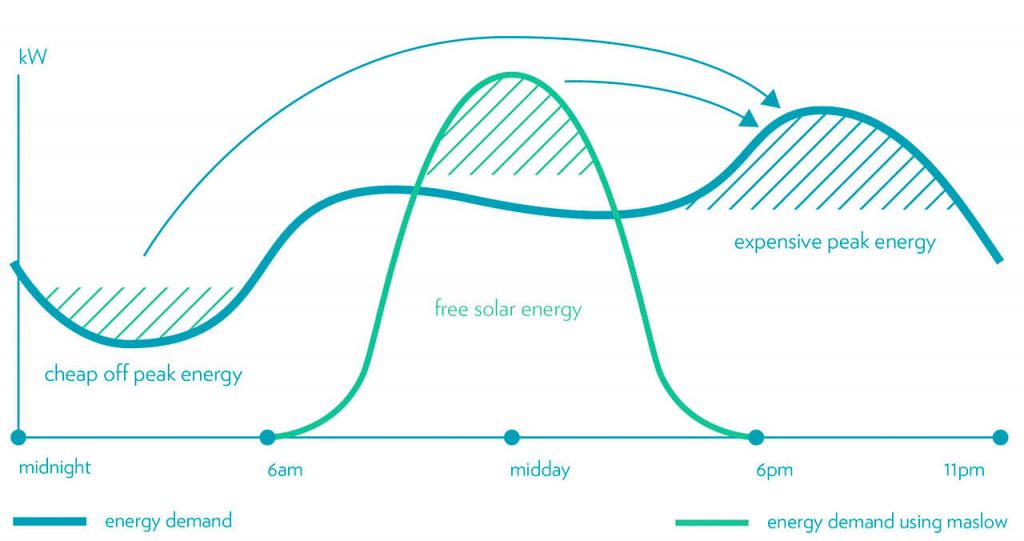
Okay, to buy or not to buy?
Suppose your electricity consumption is low during midday and peaks during evenings. In that case, you can consider solar energy storage to store excess solar energy and save it for later (see figure above).
However, we don’t thoroughly recommend this simply because of the extra cost. An energy storage add-on can nearly double your installation bill.
Therefore, selling excess solar energy through the SEG tariffs could be an excellent alternative to energy storage.
Future Opportunity for Electric Vehicles as Energy Storage
An interesting workaround that you should watch out for is the vehicle-to-grid (V2G) scheme in the UK. The Office of Gas and Electricity Markets (OFGEM) began this initiative with car companies in 2018 to use electric vehicles (EV) for grid applications.
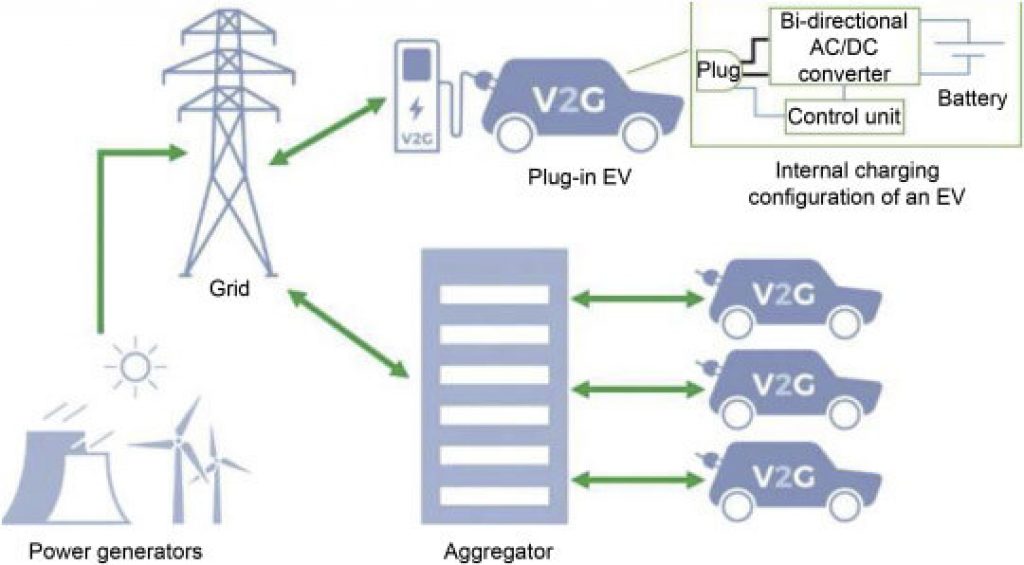
Yes, this means EV’s can have a dual purpose if done correctly.
It is still a young concept, but OFGEM reported customers in the trial earning as much as £725 a year without needing to do anything except keep their cars plugged in when they are not in use.
This will be an excellent opportunity to look into once you have your solar system installed.
For example, you can inject a portion of your EV battery charge during peak hours (5-8 pm) to the grid in the future. Then, you chargeback what you need during the night when demand is low.
Bottom line: Energy storage is perfect for homes with excess solar power during the day and consumes most of its electricity in the evening. However, the current affordability of solar plus storage price makes it difficult for everyone to adopt this setup.
Will Solar Panels Increase My Home Value In The UK?
Now, does installing solar panels increase the value of your home?
Yes, and a home with a solar system isn’t difficult to sell, given that the majority of the public supports renewable energy in the UK.
Tip: a low 12-month electricity bill displayed in your advertisement is a big selling point.
However, things get complicated when the solar panels come with a loan or lease obligation. Make sure you find a way to settle your debt if you’re selling the house.
In summary, solar panels increase the home value in the UK. Secondly, solar panels are a selling point of your property since 85% of Britons support the clean energy movement. Settle leases and loans to prevent to avoid turning away potential buyers.
Final Thoughts
Are solar panels worth it in the UK? Is it worth it in monetary terms?
Yes. No. Maybe.
It depends on how you define “worth it.”
From a purely financial perspective, it will take about 13.5 years for you to get your money back, depending on your setup. Using solar plus storage for thermal applications reduces your gas usage and enables you to enjoy the perks of the RHI.
Getting solar right now also opens doors for you. We mentioned that the UK government has its eyes set on V2G applications.
In the future, purchasing electric vehicles along with your solar could mean more perks from a financial standpoint.
For landlords and homeowners looking to sell a property with a solar panel system means your tenants or buyers get to enjoy lower electricity rates. In the UK, a lower electricity bill is a plus if marketed properly.
Lastly, our concluding justification for you to get a solar panel today is something intangible but worthwhile. I think most of you have already noticed the effects of climate change in the form of rising temperatures, hotter summers, rising sea levels, and more flooding.
Solar panels may take some time to recuperate costs, but for us at Climatebiz, the bliss of contributing to sustainable living that most Britons are fighting for is definitely worth it indeed

